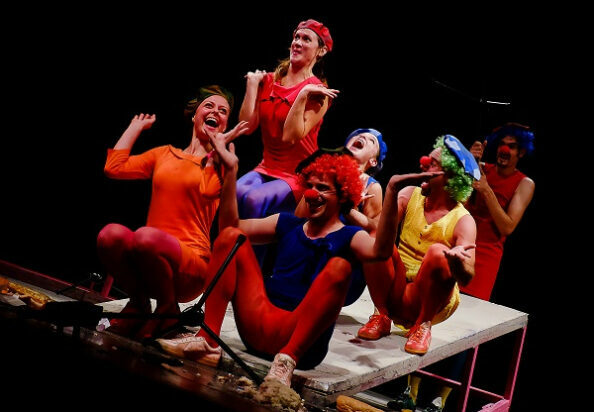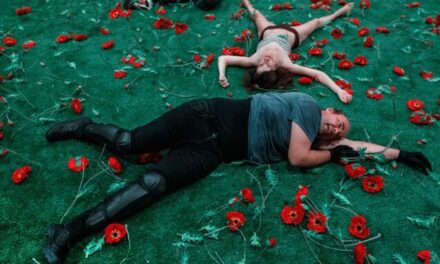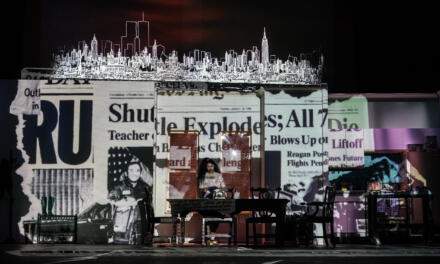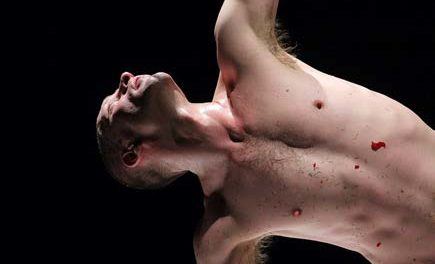Kokan Mladenović’s name is well known both within and outside the theatre: he is the director who will not keep quiet, and won’t tolerate it from others either.
Kokan Mladenović: I’ve recently finished a project in Bitola, Macedonia, where we put Noah’s (New) Macedonia on stage. It revolves around nationalism, abuse, falsified history, the Macedonians today as the Macedonian nation of antiquity… All this has very little to do with common sense, nevertheless, these were the events of the recent past, with somewhat of a twist. It features a mountain called Sararat (referring to the Ararat of the Bible), a secret document, Noah and his ark, that is the new wave of migrants, which also made its entrance through Macedonia. In other words, political satire.
R: Why are you intrigued by the genre of political satire?
KM: Because it gives me an opportunity to work with engaged theatrical participants. We are living in dark times. It is immoral if an artist has no point of view about his or her own era. It is madness not to confront all that is happening in front of our eyes, and satirical humor works really well for me. It is a winning combination: an engaged theatre that also entertains. It is a popular aggressive form in which I thrive.
R: Have you ever directed a play that lacked this political commitment?
KM: I don’t think so. Reality sets a course for us and it also sets our topics and the method with which we approach it. Why are Antigone and Hamlet relevant again? These classical texts do not deserve to be on stage due to their literary merits, but because they tell us about our own day and age.
R: A Cloud In Pants was produced in the Dezső Kosztolányi Theatre in Subotica, and revolution was mentioned several times during rehearsals. Do you believe in revolutions?
KM: A revolution is a necessary cause, but impossible today.
R: Why?
KM: Revolution above all presupposes class struggle, class awareness. The existence of an organized group that is aware of its situation, wishes to change it and make the world a better place in the meantime. As the proletariat left the stage of world politics towards the end of the twentieth century, the only force that was able to turn things around with a clear view of its own vulnerability ceased to be. Ever since communism and the Soviet revolution a century ago no prominent political idea has been formed that offered the prospect of change to mankind. I’m afraid we will have to fight within our own immediate environments for things to work better and more honorably, as we cannot influence the global processes.
R: Comfortable armchair revolutions were also discussed several times: we silently click and post away.
KM: A comfortable revolution does more harm than good. It provides the illusion of rebellion, all it entails is a like, a comment, a post. The internet offers a false image of freedom. Not only does it leave power unscathed, it even serves it by providing a valve to decrease the pressure that would otherwise gradually become unbearable and bring about real change.
R: What play would you direct in Hungary if you were commissioned to do so?
KM: Hamlet, for instance. Hamlet was desperate as well in his own age. His world collapsed for the same reasons our world does today. A family fell apart, a nation lives off the falsification of its own history, built on a crime, and a profaned, destroyed love influences Hamlet and Ophelia. The ghosts of the past do not let them live their lives. Brecht’s early plays would be highly adequate too, Baal, for example, and there are the satires of Aristophanes. The extent to which we can still see our own reflections in them is incredible: basic human flaws have not changed.
R: If you observe the theatrical world in Hungary and Serbia, what do you think is missing from one or the other?
KM: With the exception of Germany, we find the same situation everywhere. There you can be freely committed, you can express an opinion, and the theatres even get support for that from the state. They support you to be the conscience and awareness of society, or at least they do not hinder you. The foundation of our theatres is individual revolts. We complicate our own lives by confronting the right-wing regimes of Hungary and Serbia. The stages of both countries are dominated by the petty bourgeoisie. Or they have a few superficially impressive, grand performances, the audience is enthralled, but these shows have no real message.
R: You have been attacked several times because of your plays, your utterances. They threaten you, they try to pull the rug from under your feet.
KM: I have experienced threats, political persecution, the cutting of the budget, and I for one have not directed in Belgrade for six years. But we all live our lives of migrants; we do not live and direct in our own cities. Oliver Frljić, András Urbán, Árpád Schilling and many other colleagues are in the same boat, because what we wish to communicate is the truth, and the truth is unpleasant. This is the price of saying what you think. Truth has lost its value. Tailor fitted lies are the most valuable commodity today. The institution of democracy is merely a screen in front of arms deals, the destruction of the planet, the monitoring and controlling of citizens, and violence. And we accept this to be a democracy, we believe that the world is free, that nations are united, when exactly the opposite is true. Serbia is led by the war criminals of the nineties, who wear “European suits”, but possess the mental instruments of aggressors. It is futile to expect them to develop into democratic leaders who listen to the opinion of others. In Serbia, people who speak up against power are marginalized, destroyed. I despair to see how these cases are met with silence even within a profession. If a university professor is sacked for his dissident thoughts, there is no strike in the institution, his position is simply filled by someone else. We also have become accomplices, and there is no moral retribution. We turn away and only care about protecting ourselves.
Translated by Péter Papolczy
http:/https://youtu.be/qUnDyDkMUfA
This article originally appeared in Revizor on February 22, 2019, and has been reposted with permission.
This post was written by the author in their personal capacity.The opinions expressed in this article are the author’s own and do not reflect the view of The Theatre Times, their staff or collaborators.
This post was written by Zsófi Szerda.
The views expressed here belong to the author and do not necessarily reflect our views and opinions.


















